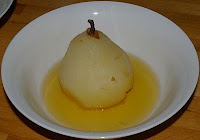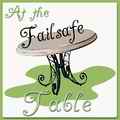Another simple dessert, courtesy of the Failsafe Cookbook, and prepared by my darling hubby.
Baked Pears
| Serves | 4 |
| Prep time | 10 minutes |
| Cook time | 40 minutes |
| Total time | 50 minutes |
| Allergy / Intolerance | Amines, Artificial Addititives, Artificial Colours, Dairy, Egg, Glutamates, Preservatives, Salicylates, Wheat |
| Suitable for | Dairy / Lactose Free, Gluten Free, RPAH Elimination Diet - Low Chemical / Failsafe |
| Meal type | Dessert |
| Misc | Child Friendly, Serve Hot |
| From book | The Failsafe Cookbook |
Quick and easy low salicylate baked pears
Ingredients
- 1/2 cup golden syrup or rice malt syrup
- 1/2 cup water
- 2 tablespoons lemon juice substitute (Refer to Basics Page)
- 4 pears (peeled)
Directions
| 1. | Preheat the oven to 180°C. |
| 2. | Combine the golden/rice malt syrup, water and lemon juice substitute. |
| 3. | Place the pears in an oven proof dish and pour the syrup over them. |
| 4. | Bake for 40 minutes or until tender. |
| 5. | Serve on its own or with vanilla ice cream or custard. |
Note
Low Chemical / FAILSAFE
Refer to the Basics Page for Lemon Juice Substitute.




 Print recipe
Print recipe


Hi.
I just wanted to say thank you for all the trouble you’ve gone to putting this blog together. I’m a 47 year old man, and I’ve known about my salicylate sensitivity for several decades. Up until a few months ago, I hadn’t truly understood what impact the sals had been having on me. It all started coming together for me after a visit to Melbourne earlier this year [2012], after a big high sal indulgence that literally stole my breath away. Hot spices, red wine, beer, pistachios, and a Turkish hubbly bubbly combined to leave my head spinning and my chest tight. Two weeks of misery followed.
Over the years I have loosely adopted a low sal diet with broken periods of high sal boredom breaks. This has led to a roller coaster of physical and emotional highs and lows for me. After my Melbourne experience, which truly put the wind up me, I decided to take the low sal road more seriously. I believe I had pushed myself into an anaphylactoid reaction. Pulling back on the sals is not so difficult, but you drop into a very dull palate very quickly. Searching for low sal recipes on the net yields very little, and a lot of the recipes contain questionable ingredients. After stumbling onto your blog, I have to say I’m wrapped.
I don’t know how this would translate to your little fella, but there are some supplements I take that have been giving me some very positive effects. A good multi vitamin, of course, to make up for any shortfalls from the limited diet. I’ve been doing a lot of research to try and get a deeper understanding of the sal impact on my system, and how to manage it, and at first I found very little helpful information. Then I discovered a whole vein of research that has been conducted into managing salicylate toxicity.
Salicylate toxicity in the general population occurs usually from overdosing on aspirin based medications. After reading the findings of different researchers eg: http://www.ncbi.nlm.nih.gov/pmc/articles/PMC2859737/, I believe that their findings can be translated down to the effects we sal sensitive people suffer under. Sals inhibit the metabolism of amino acids. This means that amino acids in whole food protein is not easily ingested. Personally, I found this leads to early fatigue during exercise. To try and counteract this, I started using BCAA [branch chain amino acid] tablets, because they are very quickly absorbed across the gastrointestinal tract. Great results. Endurance during exercise markedly improved.Added bonus of greater muscle tone. Salicylates also inhibit the Krebs cycle, which is the cycle that releases energy from cells into the body. In me, this manifests as lethargy and fogginess of the mind. To counter this, I started using citrulline malate powder, and the results have been wonderful. I feel generally more cheerful and my thinking is much more focused. I’ve also found that with the restricted nature of the low sal diet, I’m not producing bile salts to the same extent as before, so I’m not digesting fats as well as I should. This means that certain vitamins and nutrients, that need to bond with fats in order to be ingested into the body, aren’t making it into my system. I have ordered a bile salt supplement, and will be trialling it soon. I first realised the lowered bile salt production, when my stools began coming out a light brown clay colour, and floated in the bowl [gross, I know, but here for educational purpose].
As I said, I don’t know how this translates to your little bloke, but it’s been a very exciting couple of months for me, and it only seems right to put it out there. Maybe this info will come into play when he gets older.
I congratulate both you and your husband on the efforts you’ve been making to give your son comfort. As someone who grew up with many “inexplicable” health issues, I look back and see where my sal sensitivity played havoc. Had my parents been armed with more knowledge, and initiative, things may have been a lot calmer for me. Oscar is truly fortunate, and as i said before, with all the effort you’ve made with your blog, so are we 🙂
cheers
Hi Paul, thank you for your comments. I’m glad to hear that you are getting your salicylate intolerance under control and finding my recipes useful. Thank you for sharing what you have found on salicylate toxicity I will definitely look into it further.
Its great you're both enjoying my blog. Thanks
You have made these baked pears seem really easy to make, thanks for the dessert idea.
This does look lovely, baked pears are so yummy. Thankyou for dropping by my blog. its lovely to 'meet' new mums out there to see how they are going with everything.
Take care
ps I'm your 41st follower!